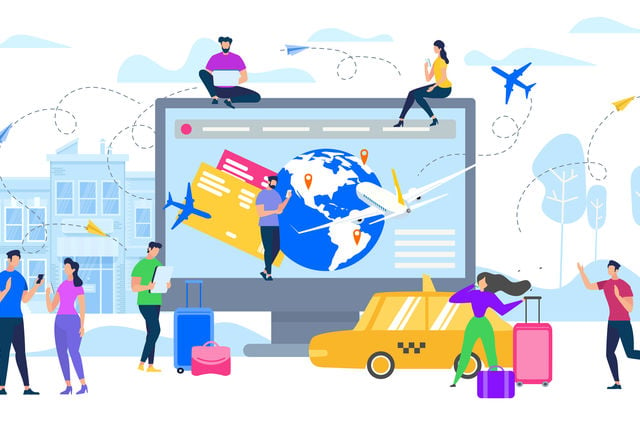Do the OTAs generate travel demand in hospitality? Part II - Revenue Management Experts Point of View
10 experts shared their view
Typically, the demand for tourism to a particular destination is a function of a myriad of factors, including general state of the economy in originating country and destination, levels of income of tourists, the cost of travel and time to travel from the tourists' homes to the destination, trends in price levels - increasing or decreasing, competition from other destinations, currency exchange rates, etc.
Here is how Xotels formulates the definition of demand in the hospitality industry: By demand, we mean the level of travel consumer interest and needs: demand for beds, demand for family rooms, demand for conference or event space, demand for entertainment and sporting events, etc.
In my view demand in the hospitality industry is greatly dependent on the general travel demand for the destination and influenced by a myriad factors, including news about inflation, unemployment data and trends, job security or lack of it, trends in home prices - rentals or owned, news about airline cancellations and horror stories of people stuck in planes for hours, price of fuel, whether your family or friends are concerned or exposed to any of the above, etc.
Some argue that OTAs like Expedia and Booking with their $12 billion annual marketing spend generate demand for hotels.
Others argue that due to the numerous and complex influencing factors mentioned above, the OTAs do not generate demand in hospitality, but merely enable and service the already existing demand. At best the OTAs redirect existing demand from one hotel to another, rarely from one destination to another.
So, the question is: do the OTAs generate demand in hospitality?
OTAs do not create demand for travel destinations. When you visit popular OTA websites, the first thing asked is: "Where are you headed?" This implies that travellers already have a destination in mind before they even visit the OTA site. The role of OTAs is more about meeting existing demand rather than generating it.
There are examples from neighbouring industries that suggest a shift is possible. Big players like Airbnb and Ryanair are aiming to do things differently. Ryanair lets you search for "any destination," and sorts options by price. Travellers are nudged to consider places they might not have thought of before which can drum up interest in specific places at specific times.
Similarly, Airbnb has evolved from a destination-focused approach to one centred on rentals and experiences. Now you can hunt for accommodations with specific features like chef's kitchens, and countryside views or look in the OMG category for out-of-this-world experiences before selecting any destination. This not only helps travellers find what they want but also inspires them to explore off-the-beaten-path destinations.
As the travel industry continues to change, the interaction between OTAs and destination demand remains an exciting space to watch."
The main purpose of an OTA is to sell rooms, converting incoming demand at the destination with the aim of earning the best possible commission. The ranking logics of the hotels on the result pages are combinations of multiple factors such as conversion, cancellation rate, content, commission level to name a few. But basically, everything starts from the customer's search for the destination, and the OTA eventually proposes hotels in neighboring locations and close distance in case of low availability. OTAs don't really drive or move demand to specific locations, but rather convert or move it from one property to another. OTAs marketing investments serve to shift the consumers' choice to use their channel, pointing at easiness to book, flexible conditions, personalized choices, loyalty. In the "dream" phase the consumer is primarily influenced by external factors (economic, social, environmental, logistic...) in choosing the destination and if we look at to the current historical period, transportation is probably one of the main drivers of influence given the rising fuel pricing and not only: the opening of a direct flight from destination A to B can generate demand that did not exist before and shift the customer preference.
Do OTAs generate demand in hospitality. The short answer is no, but they can in limited conditions.
In the business/group related traveler the answer is a harder no. Generally since the budgets and logisitics are more controlled.
In the leisure traveller, it is a little bit easier if they are flexible for their disposal dollar which may or may not be related to travel and hospitality.
Real World Example: I was planning for my wife's birthday abut 10 years ago to take her to a Elton John Concert in Las Vegas. I was going to buy the VIP Backstage Pass. The cost was just over $1000 per ticket, So it was the trip to Vegas, dinner, hotel,etc. Right around the same time of my planing - round trip tickets sales to Paris were made available just under $500 round trip - I jumped on it. We ended spending about $1000 more overall than the Vegas trip budget, but the value differential was worth it.
So, my final point is if through marketing (OTA or other) you can show awareness or value- you can create and/or shift demand (Las Vegas vs. Paris), but it is very limited.
Yes - in a way ...and No.
Yes - in a way:
OTA's, Social Media posts, destination marketing organizations, newsletters, and emails containing special offers, etc., all stimulate interest in leisure travel.
OTA's are helpful during the planning phase since users can quickly compare prices and availability between various options being considered. They also streamline the booking process, so this reduced "friction" in the booking process may contribute to an extra emotional purchase or two - in the same way that carefully placed items near the exit to a grocery store may entice a shopper to pick up an extra item on their way out.
...and No:
A recent report indicates that Booking.com spent $1.8B in marketing in Q2 2023 alone. Do you think their marketing spend was close to that in 2020 during the COVID crisis? Why not?
If OTA's could directly generate demand, their marketing spend would likely have been as high in 2020 as in 2023. OTA's are very good at directing existing demand to their own particular channels but are not necessarily in the demand generation business, so relying on OTA's to drive demand to your particular operation would be a mistake.
It is hard to argue with billions of dollars spent annually on marketing by the largest OTAs. One could certainly make the case that such a robust amount of travel-related content would spark travel wanderlust from even the most "home-rooted" consumer. Over the last 2 years we saw an increase in OTA share vs direct or brand bookings, this seems to indicate that while most brands halted or delayed marketing spend as a way to preserve cash, OTA's were able to take advantage and sway a customer to book on their site instead.
So, whether there is new demand creation or shifting of the existing demand, there is enough evidence to suggest there OTA's have an impact in the hospitality industry. How we take advantage or that demand or how we yield it, it is up to us as commercial leaders to forge a strategy that improves our revenue growth in the most profitable way.
Related article by Raul Moronta
There's surely a difference between generating demand in a market/destination on one side and capturing, channeling or driving the demand on the other side.
Demand in hospitality is generated by factors like type of destination, events, connections, attractions, infrastructure meeting the needs and desire of the guests and OTAs have no influence on these factors.
But what OTAs excel at is capturing that demand and channeling from property to property or from a destination to a competitive destination.
Let's make an example, when there"s high demand for historical/capital cities, that demand can distribute between all of them but OTAs can drive it from Rome to Paris or to London or to any capital city with similar characteristic responding to that demand.
I personally see the $12 billions spent in advertising by the OTAs are first of all to WIN GUESTS from their OTA competitors and most of all from the hotels. There's no way their ads can generate demand to a destination with no demand because of the lack of the basic triggers: connections, touristic infrastractures, kind of destination (leisure/business, fashion/sport events ect.)
So to make a long story short, No OTAs CANNOT GENERATE DEMAND.
If OTAs were to promote a single destination exclusively, they could redirect some of the demand towards it and away from other destinations. However, such a scenario is unlikely to occur. OTAs do not create travel demand for specific destinations, in my opinion.
Nevertheless, OTAs do possess areas of influence:
- Booking window. Destination-focused campaigns can affect the booking window for the hotels in the market.
- Discovery and dreaming. OTAs can influence where people will travel for their next vacation by providing destination choices in marketing campaigns.
- Billboard effect. OTAs help people discover hotels in the area and able to direct demand toward a particular property.
- Package offers. OTAs can influence buying decisions by combining flights, hotels, and car rentals in attractive packages.
- AI trip planning. As OTAs incorporate AI-powered travel itineraries, it remains to be seen how this will impact local attractions, hotels, and transportation.
From a macro perspective, travel demand in hospitality is specific by destination and is impacted by factors such as infrastructure, time, accessibility, cost, attractions, and others.
Online travel agents (OTA) provide the means for you to research, compare and book components of your trip, offering options for each leg of travel. As you can compare, one can argue that the OTAs influence consumer behavior at a certain level, for instance when the purpose of the trip – leisure or business – becomes relevant.
I believe we can consider OTAs an influencer of decisions, mainly for leisure travel, much like traditional travel agents have done. Would you agree that travel agents generate travel demand, or do they influence decisions?
From a traveler's perspective, OTAs are a good source of comparison. Depending on their savviness, it could be easy to compare and select. For others, it could be overwhelming and confusing.
While OTAs like Booking.com and Expedia significantly capture high-intent demand within the mid and bottom funnel, I doubt they can create demand from scratch.
Max rightly mentioned that non-price factors influence tourism demand, particularly the destination's image. Tourists are guided by attractions, amenities, and accessibility when selecting a destination – elements in which OTAs have limited impact. Despite substantial marketing investments, the primary focus of OTAs like Expedia and Booking targets activities within the mid-bottom funnel segments.
My personal experience is that OTAs contribute significantly to facilitating and serving existing demand, but their role in generating entirely new travel demand within the hospitality industry remains limited.
No, the OTAs do not generate demand in hospitality.
To understand why, it is essential to acknowledge the importance of destination-specific drivers of demand for overnight accommodation. Each destination has its unique allure, whether natural beauty (a beach), cultural attractions (Rome), or artificial wonders (Disney). These intrinsic features primarily stimulate traveler interest. It is rarely the case that OTAs create and promote travel reasons. Instead, with their vast marketing budgets, OTAs primarily aggregate and present travel options, focusing on attracting users to their platforms rather than creating demand for specific destinations. OTAs have only shifted bookings from direct hotel channels to third-party platforms. This shift impacts hotels differently based on their ability to manage these channels and can change the dynamics of customer acquisition costs. The relationship between hotels and OTAs is intricate. While OTAs provide increased visibility, they come at a commission cost. Hotels must balance between direct bookings, which might have lower acquisition costs, and third-party channels for broader reach. While OTAs might not drive demand for a destination, they excel in capturing and directing existing demand, offering travelers tools for informed trip decisions and a friction-free booking process.











